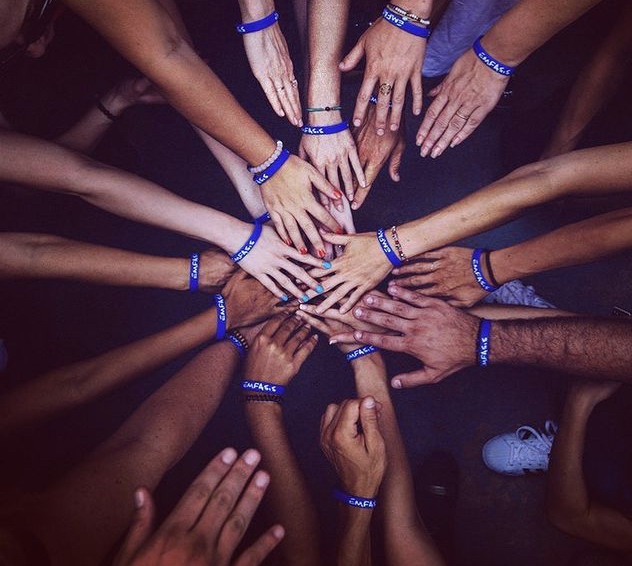Photo credit: Deb Silver – Creative Commons Flickr
Raising One’s Voice – Understanding the Brain Science of Yelling
We’ve all had times when we’ve raised our voice, lost our temper, or said mean words, and later regretted it. It can happen so fast because the Amygdala (the alarm centre of the brain which serves to protect us) located in the limbic part of our brain, acts on instinct and goes into FIGHT, FLIGHT or FREEZE before we have time to think. As soon as there is an emotional ambush, we are flooded with Adrenalin and in the case of raising one’s voice, yelling or losing one’s temper, we are in FIGHT mode. I also teach this according to Dr. Daniel Siegel’s metaphor of “Flipping One’s Lid”. If this happens, it is critical to walk away and calm down without saying or doing more damage. Once we have calmed down, our Pre-Frontal Cortex, also known as “the wise leader” will re-engage and we will be able to be in a more rational state of mind. There is no point trying to rationalize with someone who has “flipped their lid”.
How To Be More Patient?
We can all imagine, as adults, how we feel, when we are overtaken by our feelings.
How could this feel for a child? Scary, overwhelming, out-of-control etc.
According to Dr. Gordon Neufeld, Vancouver based Developmental Psychologist, the Pre-Frontal Cortex (the “wise leader” which helps us to problem solve and self-regulate) begins to develop in children around ages 5-7 yrs. and for more intense children, around age 8 yrs. Therefore, the first step is for us to realize that young children don’t have the capacity to regulate their emotions in the way that we often expect them to. When they start to “lose it”, they feel scared underneath as this tidal wave of emotions comes over them, and if the trusted adult they are with, also “loses it” then they feel even more scared and out of control. Therefore, for us to remain patient, we need to have empathy and remember the sage words of Dr. Ross Greene (author of The Explosive Child):
Children do well if they can versus Children do well if they wanna!
We can also turn to Habit #5 from Stephen Covey’s 7 Habits for Highly Effective Families: Seek First to Understand…Then to Be Understood
Stephen Covey quotes the fox from the classic story, The Little Prince:
And now here is my secret, a very simple secret: It is only with the heart that one can see rightly; what is essential is invisible to the eye
Things Are Not Always As They Appear…
Photo credit: Flickr creative commons Orange Onion
I love optical illusions! I think they are a very powerful reminder that there’s more than one way to look at an image or event. In the case of this pink, purple and orange picture, one could be reminded that things often seem to be bigger than they really are. Do you find these circles are getting larger the longer you stare at them? Stephen Covey describes how we are all see the world through our own unique set of experiences. If we get stuck in being “right” and there being only “one way”, we get caught in our Ego and we lose the ability to communicate. Stephen Covey says “At the heart of family pain, is MISunderstanding” (p. 204, The 7 Habits of Highly Effective Families).
By seeking to understand, we are creating a huge emotional deposit into our family member’s emotional bank account. By seeking to understand, through empathizing, emotion coaching, reflecting, asking caring questions, etc. we are able to lower the other person’s defenses and realize that he/she is not coming from a place of malcontent. I like to suggest that one always asks oneself the question:
“What is or What was the person’s intent?”
In my experience, people mostly have positive intentions, but sometimes there is miscommunication which can lead to judgment and anger. It’s also important to weigh up possible contributing factors such as hunger, tiredness, sickness, anxiety etc. “Seek first to understand…then to be understood” (p. 201)
What is the Best Way to Be Understood?
Stephen Covey gives three pieces of advice:
1. Give feedback in ways that have positive energy and show respect
- Is this feedback necessary and helpful?
- Seek first to understand the other person’s perspective
- Separate the deed from the “do-er” – describe feelings about the behaviour but don’t label the other person
- Be especially kind when it comes to a sensitive issue where there may be blind spots
- Use “I” messages… Eg. “This is what is causing me concern…” “I am feeling…” “My perception is that…”
2. Nurture the habit of Culture
- Use habitual family meetings and family time as an opportunity to show empathy and problem solve
3. Understand Developmental Stages (see my post on Erik Erickson’s stages of psycho-social development)
- Build the emotional bank account and take time for training regarding house expectations
One of the main messages I teach to children and parents is: OUR THOUGHTS CREATE OUR FEELINGS. Take a pause before responding to a situation. There is space between the event and our thoughts. Push that pause button, take a deep breath, and try to see things in a different way. Breathe, breathe, breathe and show empathy, empathy, empathy.
I’ll leave you with one more optical illusion as a reminder that things are not always as they seem.
(Photo credit: Flickr creative commons robot)
I hope you find these tools useful.
Have a wonderful week,
Warmly,
My 6 Top Apps for Creating More Calm for You and Your Children!
Want to Connect?
Subscribe now to receive free weekly parenting tips and inspiration.










